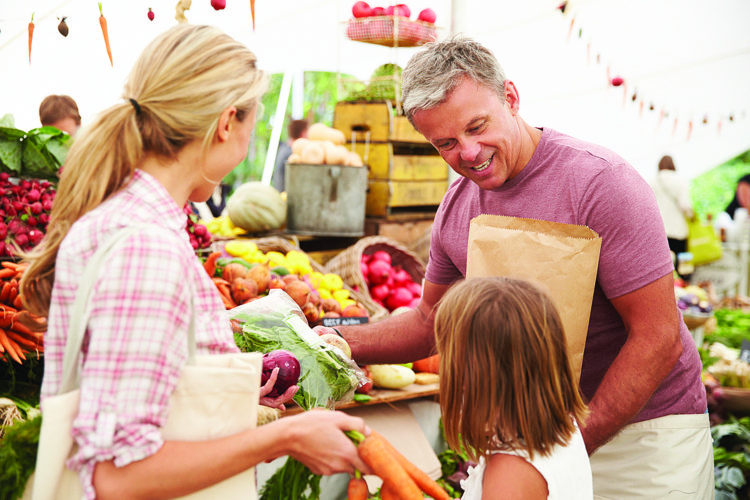Farmers Markets provide a casual atmosphere to meet farmers, ask them questions about their products, and purchase fresh fruits and vegetables. Fresh, canned, and frozen produce can all be great choices when it comes to eating more fruits and vegetables, but fresh produce that’s in-season may be cheaper and taste better than its canned or frozen variety, especially at the Farmers Market.
 Some farmers at your local Farmers Market may take credit or debit cards, but it’s a good idea to bring enough cash just in case. Also, you may choose to call before you go to see if the farmers take SNAP/EBT or WIC Farmers Market Nutrition Program vouchers. One way you may be able to save money is to compare prices at different stands. There may be many farmers selling the same product. Take your time and see what the best deal is!
Some farmers at your local Farmers Market may take credit or debit cards, but it’s a good idea to bring enough cash just in case. Also, you may choose to call before you go to see if the farmers take SNAP/EBT or WIC Farmers Market Nutrition Program vouchers. One way you may be able to save money is to compare prices at different stands. There may be many farmers selling the same product. Take your time and see what the best deal is!
Like at the grocery store, in your home, and at restaurants, it’s important to think about food safety at the Farmers Market. Many Farmers Markets have food safety guidelines, but consider asking these questions to the farmers:
- Farming Practices
- What water source do you use? How is that source tested for safety?
- What types of soil amendments do you use?
- Are animals raised on the farm? If so, are they kept separate from produce?
- Staff
- Are staff trained in food safety practices?
- Do staff have access to handwashing stations and restroom facilities?
- What do you do if an employee is sick?
- Food Products & Materials
- How are food products transported?
- How are equipment, utensils, and food contact surfaces cleaned?
- For milk, cheese, and juices: was the product pasteurized to kill dangerous germs?
- What temperature is the product being stored at? Raw meat, eggs, dairy, seafood, cut produce, leafy greens, and sprouts should be stored on ice or in coolers below 41°F. Hot ready-to-eat foods should be held at 135°F or higher. Farmers should have a thermometer on hand to check the temperature.
Other things to look out for include available handwashing stations and coverings for the stand to protect from direct sun, rain, and birds. Check out this link to learn more about these questions to ask your farmer!
Remember to bring your own cloth bags and clean plastic bags to carry your products in to help reduce waste and costs for the farmers. Like produce purchased at the grocery store, you should still wash Farmers Market produce under running water before eating or cutting it.
You can support local farmers this Farmers Market Week (and any time of the year) by visiting your local Farmers Market. About three times a farmer’s sales at the Farmers Market goes back into the local economy, making purchasing from Farmers Markets a win-win-win: you get fresh, delicious produce, the farmer makes more sales than he or she would be selling elsewhere and your town benefits from it.
To find a Farmers Market near you, visit http://www.gottobenc.com/find-nc-products/farm-fresh/farmers-markets/.
-Cara